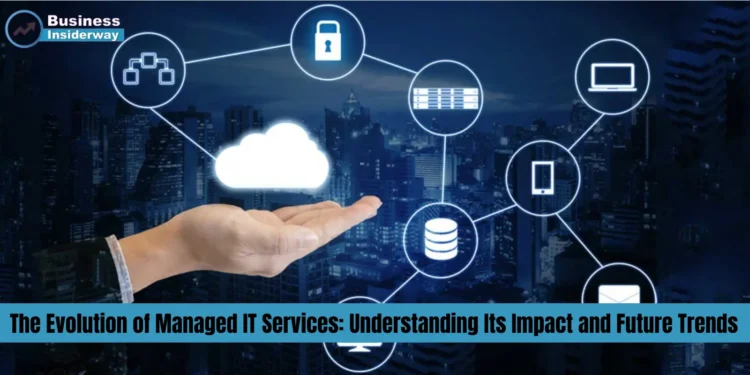Key Takeaways:
- Exploration of the historical transformation and sustained value of managed IT services.
- Automation, AI, and cybersecurity are prominent in modern IT support.
- Prospects of managed IT services and strategies for businesses to stay ahead.
Maintaining robust, resilient, and efficient IT systems has become critical as the business world increasingly relies on technology. Managed IT services have rapidly evolved from a luxury to a necessity, enabling businesses of all sizes to focus on their core functions without being bogged down by the complexity of technology management. These services are not just about troubleshooting; they enable strategic planning and scaling technology according to business needs.
The Roots of Managed IT Services
In the 1990s, businesses began relying more heavily on technology for their day-to-day operations; the IT services industry adapted by providing management services that offered repair and proactive monitoring and maintenance. This signified a shift from the traditional ‘break-fix’ models, wherein service was only offered when something went wrong. Managed IT represented a paradigm shift towards a subscription-based model that allowed businesses to receive ongoing support, improving their technological reliability and overall efficiency.
Understanding Managed IT Services Today
Today, managed IT services represent a full-fledged industry that ensures business operational continuity. Companies are prioritizing specialized IT Support Nashville services to manage their technology needs. These services include the management of networks, hardware, software, and cybersecurity efforts, all intended to keep a business’s digital infrastructure up to speed with the latest technology while avoiding the pitfalls of system outages or data breaches. Importantly, managed IT services professionals are also there to equip staff with the right tools for communication and collaboration, which is especially vital in an era where remote work has become commonplace.
The Advantages of Outsourcing IT
Companies can reap substantial benefits beyond simple tech support by turning to managed IT service providers. Financial predictability is one such benefit, as outsourcing IT allows companies to operate on a fixed, subscription-like plan instead of unpredictable costs associated with internal management. This enables better financial planning and control. Additionally, managed IT services give businesses access to a broader spectrum of expertise and talent they may not have internally, fostering innovation and growth while assuring high levels of quality and security.
The Role of Automation and AI in Managed IT
The field of managed IT also embraces the latest technological advancements, such as automation and artificial intelligence (AI), to streamline its processes. Automation technology takes over repetitive, day-to-day tasks, freeing up human resources to focus on more strategic activities. AI, on the other hand, offers predictive insights that lead to more intelligent decision-making. By harnessing these technologies within the IT support framework, service providers can provide unprecedented efficiency and accuracy, future-proofing the businesses they support.
Managed Services and Cybersecurity
Cybersecurity is at the forefront of IT management challenges, with threats evolving and becoming more sophisticated. Managed IT service providers have specialized knowledge and tools to safeguard businesses against these threats, offering peace of mind and security. These services often include monitoring systems for unusual activity, updating software to mitigate vulnerabilities, and educating employees about security best practices, which are crucial for maintaining a business’s defense mechanism against cyber threats.
Navigating the Challenges of Managed IT Services
Adopting managed IT services does come with its set of challenges. Companies must carefully plan and vet to ensure the managed services provider (MSP) aligns with their specific business goals and cultural fit. Managing the transition, fostering a good working relationship, and setting clear performance metrics are crucial to getting the most out of a partnership with an MSP. Businesses must be diligent in their selection process to guarantee that their IT requirements meet the highest standards.
Future Trends in Managed IT
The future of managed IT will likely be characterized by an increased reliance on cloud-based platforms, greater integration of machine learning and IoT devices, and a focus on sustainable IT practices. Continuous learning and adapting are the day’s orders as technology evolves. Service providers that can anticipate and respond to these trends will offer their clients a significant competitive advantage.
Choosing the Right Managed IT Service Provider
When selecting a managed IT service provider, businesses should consider their track record, ability to provide round-the-clock support, and expertise in dealing with industry-specific compliance and privacy issues. Ultimately, a good MSP acts as a partner that understands business objectives and can scale its services to meet growing or changing needs.
For a comprehensive examination of how managed IT services have become a powerhouse in business innovation, review the insights provided by Forbes Tech Council. Additionally, the Wired Guide to Cybersecurity serves as a valuable guide to understanding the critical role of cybersecurity in this digital age. These resources furnish businesses with helpful information, helping them navigate the intricate managed IT ecosystem and build sustainable and forward-thinking strategies.
In conclusion, the transformative power of managed IT services can’t be understated. With its roots in pre-millennium tech support, its evolution has been remarkable. Modern businesses are looking for more than just IT support; they are looking for IT partnerships that can assist in driving their technological efforts forward. In doing so, they can innovate, compete, and succeed in the fast-paced, technology-driven market of the 21st century.














